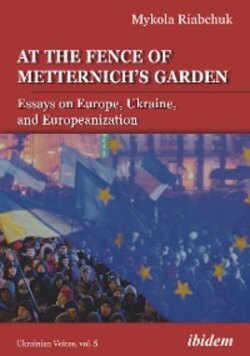Читать книгу At the Fence of Metternich's Garden - Mykola Riabchuk - Страница 13
(4) ‘Eurasian’ Othering
ОглавлениеThe term ‘Eurasia’ has many meanings but all of them can be subsumed under two main rubrics. The first is purely geographical, referring to a formidable landmass stretching from the Atlantic to the Pacific and considering Europe and Asia as a single continental entity, with the former as a peninsula of the latter. The second meaning is much more versatile but in all its multi-faceted representations it refers typically to a Greater Russia, to some space dominated historically by the Russian Empire and its Soviet (and post-Soviet) reincarnation. The term is rather political, cultural, and ideological than purely geographical. It entails not only the idea of Russian political dominance, whether justified or not, whether legitimate (in terms of mission civilisatrice and/or ‘liberation’ of neighbors from somebody else) or illegitimate (in terms of imperial conquest and subjugation). It also promotes the idea of the cultural/civilizational peculiarity of the region, suggesting that it is neither Europe nor Asia but some mixture of both that represents a separate and very special ‘Eurasian’ civilization. Its essence is Russian culture—but rather imperial than national. The common imperial past and some imprints of Russian imperial culture are the only thing that draws together the nations that otherwise are worlds apart in all possible terms, like the Ukrainians and Turkmens, or the Moldovans and Chukchi, or the Belarusians and Buryats. It would be rather impossible to pack them all into one bag if there were not a common denominator—a Greater Russia.
One need not be an expert in critical discourse analysis to figure out that such a labeling is highly harmful in both political and cultural terms for all the parties involved. First, it mystifies the reality. It features the Russian/Soviet imperial legacy and post-imperial influence as the only or the main factor that determines virtually everything in today’s (under)development of post-Soviet republics. In some cases this factor is really important, in other cases many more historical and present-day variables are involved that, unfortunately, are neglected or undermined. Secondly, the ‘Eurasian’ labeling implicitly encourages Russian imperial feelings and great-power politics, endows it with some international legitimacy, and discursively resonates with the most chauvinistic, crypto-fascist tenets of today’s Russian ‘neo-Eurasianists’. And thirdly, it discursively excludes all the European nations of the former Soviet empire from Europe and effectively marginalizes pro-European forces in all these countries (including Russia itself), making them easy prey for Russian/pro-Russian profoundly anti-Western nationalists.
In other words, the term ‘Eurasia’ lacks not only precision (which is hardly achievable in any taxonomy) but also impartiality—and this is a very serious flaw in international politics, especially where it plays into the hands of a former empire that still seeks to re-establish its neocolonial dominance. Indeed, the main thing that the ‘Eurasian’ countries have in common (at least in the European realm of the former Soviet empire) is their profound internal divide between pro-Western and anti-Western forces—a divide that reflects not only opposite geopolitical orientations but also systems of values, historical narratives, and, still worse, national identities.
In this regard, Ukraine, and Moldova, and Belarus can be considered as ‘not-quite-European’. There is nothing wrong in admitting this fact—as an important factor that precludes their European integration and, probably, modernization. But labeling them ‘Eurasian’ is another matter. It means, in fact, interference in domestic ideological infighting and taking the side of ‘Eurasian’, pro-Russian, profoundly anti-European forces. It helps to shift a tough balance between rival parties in the ‘Eurasian’, anti-Western direction. No alternative to the term ‘Eurasian’ is perfect but, in most cases, the term ‘post-Soviet’ looks more precise and far more neutral than the term ‘Eurasian’.
